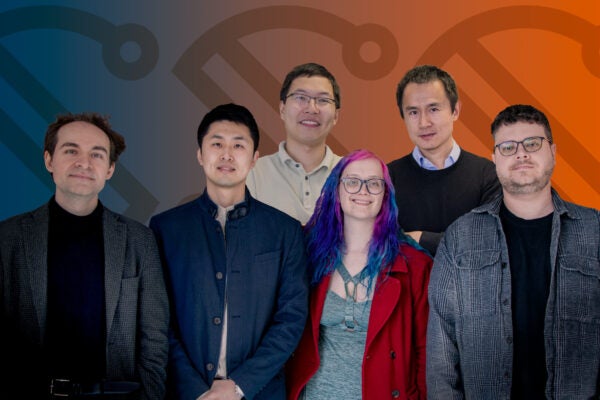Six University of Texas at Austin faculty members were announced today as recipients of Sloan Research Fellowships from the Alfred P. Sloan Foundation, putting UT Austin at the forefront among public universities boasting winners this year.
UT’s 2025 Sloan Research Fellows are Edoardo Baldini, an assistant professor of physics; Linran Fan, an assistant professor of electrical and computer engineering; Joe Kileel and Maggie Miller, both assistant professors of mathematics; David J. Wu, an assistant professor of computer science; and Xue-Xin Wei, an assistant professor of neuroscience.
Each year, the Sloan Foundation selects fellows based on their creativity, independent research and potential to become future leaders in their respective fields. Since its establishment 70 years ago, the fellowship has become one of the most prestigious awards available to early-career researchers.
“These outstanding faculty members are leading some of the most exciting early-career research projects anywhere on the continent, and we are incredibly proud to call them Longhorns,” said Rachel Mersey, executive vice president and provost. “Receiving a Sloan Research Fellowship is a testament to both their individual excellence and the colleges, schools and departments that helped bring such promising talent to our campus and community.”
Past fellows have gone on to receive major accolades, including Nobel Prizes and National Medals of Science. This year’s cohort includes 126 scholars from 51 institutions across the United States and Canada, selected from among more than 1,000 nominated individuals.
“These extraordinary scholars are already making significant contributions, and we are confident they will shape the future of their fields in remarkable ways,” said Adam F. Falk, president of the Alfred P. Sloan Foundation.
About the Recipients
Baldini investigates quantum materials and their ultrafast dynamics using advanced laser spectroscopy techniques. His research explores how light can be used to control and manipulate the quantum properties of materials, shedding light on novel electronic phases and emergent behaviors in strongly correlated systems. His work aims to uncover new quantum phases of matter and explore light-induced phase transitions, with potential applications in next-generation electronic and spintronic devices.
Fan’s research focuses on nonlinear interactions between optical photons, superconducting circuits, electron spins and acoustic waves at the quantum level. Using a hybrid system of novel, light-based devices and materials and quantum principles, he aims to improve precise measurements, communication and information processing.
Kileel’s research spans applied mathematics and data science, with a special focus on computational algebra. His work leverages algebraic and geometric structure to improve computational methods in areas like scientific imaging, computer vision and machine learning. Kileel’s research contributes to making complex data processing tasks more efficient and accurate.
Miller’s research focuses on low-dimensional topology, particularly the study of 4-manifolds and knotted surfaces. Her work investigates the fundamental structures of geometric and algebraic topology, with connections to pure mathematical theory and theoretical physics. She is interested in how different mathematical structures relate to each other and contribute to a deeper understanding of space and shape.
Wu’s research focuses on theoretical and applied cryptography, building privacy-preserving systems and securing cloud computations. His work develops new cryptographic protocols that enable secure computations over encrypted data, allowing users to both perform operations without exposing sensitive information as well as verify the correctness and authenticity of outsourced computations.
Wei studies computational neuroscience, focusing on how the brain processes information. His research combines mathematical modeling and experimental data to uncover the neural basis of cognition. In particular, he seeks to understand why the brain is so efficient, robust and flexible. His interdisciplinary approach bridges neuroscience, psychology and artificial intelligence to uncover fundamental principles of brain function. His work has implications for neural disorders and the development of brain-inspired artificial intelligence systems.
The Sloan Research Fellowship provides recipients with a two-year, $75,000 grant to support their research. Among the more than 1,000 researchers nominated for fellowships were chemists, computer scientists, Earth system scientists, economists, mathematicians, neuroscientists and physicists. Independent panels of senior scholars select Sloan Research Fellows based on their research accomplishments, creativity and potential to become a leader in their field.
Among public institutions, no university had more Sloan Fellows this year than UT, though the University of California Los Angeles and University of California Berkeley tied. Including this year’s winners, 107 faculty from UT Austin have received a Sloan Research Fellowship since the awards began in 1955.




